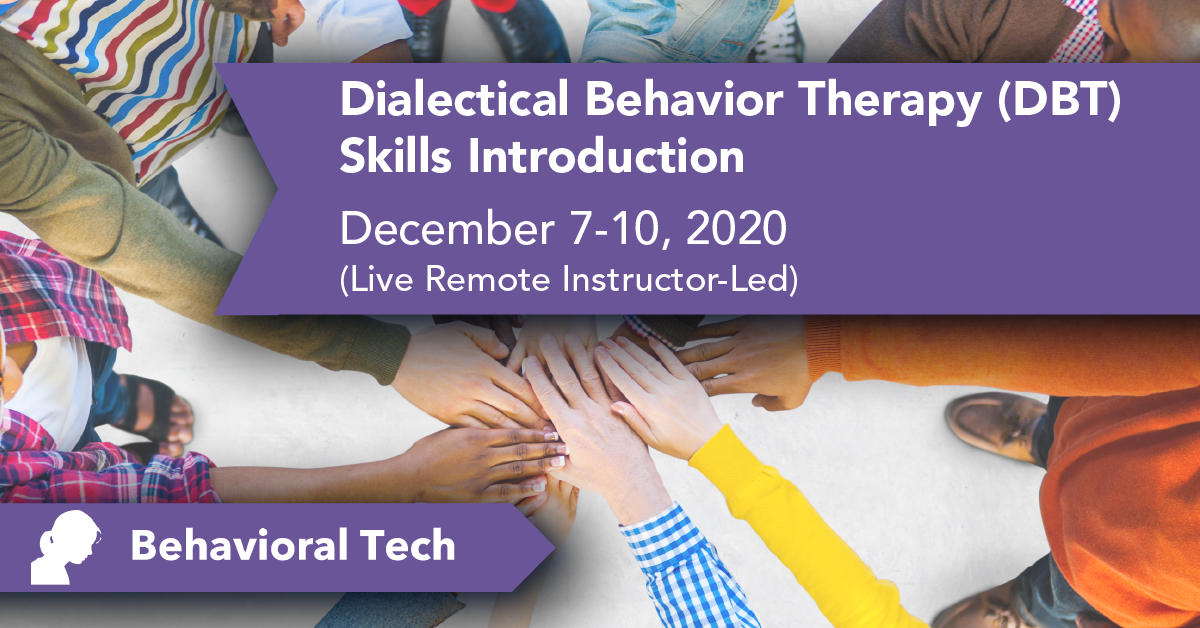To learn more about the types of training and consultation that BTECH offers, visit our Training Catalog here.
Interested in a training that is sold out? Please join our Waiting List so we can contact you as we schedule future events.

- This event has passed.
Dialectical Behavior Therapy Skills: Introduction

Level 2
Live, Remote, Instructor-led
December 7th – 10th, 2020
Trainer: Vibh Forsythe Cox
Training Description
Course Description
This live remote instructor-led course consists of eight 90-minute modules delivered online for a total of 12 instructor led
hours. Each module includes reading and homework tasks. Total participant time required for each module is
approximately 2.5 – 3 hours.
Research indicates that DBT skills are a key mechanism of change for suicide attempts, non-suicidal self-injury,
depression, and anger, and multiple randomized control trials have shown DBT skills to be effective for a variety of
problems, including depression, emotion dysregulation, binge eating, and borderline personality disorder.
This introduction to DBT Skills Training introduces Dialectical Behavior Therapy (DBT) Skills: Core Mindfulness, Distress
Tolerance, Emotion Regulation, and Interpersonal Effectiveness. Participants learn about the function of skills training in
DBT, the structure of a DBT skills training program, the goals and general content of each skills module, and the targets
for DBT skills training. It also provides an overview of the manner in which DBT conceptualizes problems, as well as the
behavior change, validation, and dialectical strategies used across all modes of the treatment. Clinical examples are
used to illustrate specific skills training procedures. Video of roundtable discussions of DBT experts, and demonstrations
of a skills training class are incorporated.
The course is designed for all mental health professionals who want to learn DBT skills to improve their work with their
clients. Prior knowledge of DBT is not required; however, learning will be enhanced if participants are familiar with Dr.
Marsha Linehan’s 1993 text, Cognitive-Behavioral Treatment of Borderline Personality Disorder, and the 2015 DBT Skills
Training Manual, Second Edition. Participants should have the latter available during the course.
This course is a precursor to the world of DBT skills training. Those who want to fully implement a DBT skills training
program are invited to follow this course with the DBT Skills Training: Fundamentals, which provides in-depth training in
acquisition, strengthening, and generalization procedures of DBT skills. DBT skills training is one of 4 modes of standard
outpatient DBT. For those who want to implement a full DBT program we recommend completion of the
comprehensive Dialectical Behavior Therapy Intensive Training.
Primary Objective:
As a result of this training participants will be able to describe the key elements of DBT skills training.
Learning Objectives
- Utilize evidence on DBT skills training to determine curriculum appropriate for treatment setting and
population. - Describe the function of DBT skills training.
- Identify the targets for DBT skills training.
- Describe the four DBT skills modules.
- Identify the strategies and procedures required for effective DBT skills training.
- Define the roles of the leader and co-leader in DBT skills training.
- Describe the dialectical nature of DBT skills.
- Describe the dialectical nature of DBT skills training.
- Identify what is valid in actions, cognitions, and emotions of patients.
- Identify what is invalid in actions, cognitions, and emotions of patients.
- Convey to patients what is valid in their actions, cognitions, and emotions.
- Describe key concepts related to increasing desired behaviors and decreasing unwanted behaviors.
- Describe strategies that can be used to pull new behaviors from clients.
- Identify the goals of DBT Mindfulness skills.
- Identify the contents of the DBT Mindfulness skills module.
- Identify the goals of DBT Interpersonal Effectiveness skills.
- Identify the contents of the DBT Interpersonal Effectiveness skills module.
- Identify the goals of the DBT Emotion Regulation skills.
- Identify the contents of the DBT Emotion Regulation skills module.
- Identify the contents of the goals of DBT Distress Tolerance skills.
- Identify the contents of the DBT Distress Tolerance skill module.
Virtual Meeting Details
Date: December 7 – 10, 2020
Time: 9:30 AM – 1:00 PM Pacific Time / 12:30 PM – 4:00 PM Eastern Time
Tuition:
o Early Bird: $250 – Cut-Off Date October 30, 2020
o Standard Registration: $275 – Cut-off Date November 27, 2020
o Last Minute Registration: $300 registrations made on or after November30, 2020
IMPORTANT: The week prior to the event, you will receive an email from our Online Portal, powered by Thinkific, with a sign-in URL and instructions. At least one day before the training, please follow the instructions to the log into the portal and review the course material.
Please email support@behavioraltech.org if you have any questions about accessing your training.
Schedule
| All Times are listed in Pacific Standard Time | ||||
| Session | 1 | 2 | 3 | 4 |
| Date | 12/7 | 12/8 | 12/9 | 12/10 |
| Time | 9:30am – 1:00pm PST | 9:30am – 1:00pm PST | 9:30am – 1:00pm PST | 9:30am – 1:00pm PST |
| Day | Monday | Tuesday | Wednesday | Thursday |
| Length | 3.5 hours | 3.5 hours | 3.5 hours | 3.5 hours |
|
Schedule includes two (2) 90-minute sessions separated by 30 minute break |
||||
Trainers
Vibh Forsythe Cox, PhD

 Seattle, WA (United States)
Vibh Forsythe Cox, PhD, is a Training and Development specialist for Behavioral Tech, LLC (BTECH). She is part of the team that creates content for BTECH’s training offerings. Dr. Forsythe Cox is also a Trainer and consultant for Behavioral Tech. In that role, she provides consultation for DBT teams, specializing in newly forming DBT teams. Dr. Forsythe Cox is a licensed Psychologist in Washington state and works as a therapist at Cadence Child and Adolescent Therapy, a DBT-Linehan Board certified DBT program in Kirkland, Washington. There, she provides DBT and other evidence-based treatments for teens and adults. Dr. Forsythe Cox is also the training advisor for the Post-Doctoral Fellowship program at Cadence and provides group and individual supervision to mental health professionals preparing for licensure. Dr. Forsythe Cox has experience providing DBT in a variety of settings, including university-based research, inpatient and outpatient hospitals, forensics, and private practice settings. She is a Clinical Instructor in the Department of Psychology at the University of Washington, where she has provided individual and group supervision to doctoral students in the Behavioral Research and Therapy Clinics (BRTC).
Seattle, WA (United States)
Vibh Forsythe Cox, PhD, is a Training and Development specialist for Behavioral Tech, LLC (BTECH). She is part of the team that creates content for BTECH’s training offerings. Dr. Forsythe Cox is also a Trainer and consultant for Behavioral Tech. In that role, she provides consultation for DBT teams, specializing in newly forming DBT teams. Dr. Forsythe Cox is a licensed Psychologist in Washington state and works as a therapist at Cadence Child and Adolescent Therapy, a DBT-Linehan Board certified DBT program in Kirkland, Washington. There, she provides DBT and other evidence-based treatments for teens and adults. Dr. Forsythe Cox is also the training advisor for the Post-Doctoral Fellowship program at Cadence and provides group and individual supervision to mental health professionals preparing for licensure. Dr. Forsythe Cox has experience providing DBT in a variety of settings, including university-based research, inpatient and outpatient hospitals, forensics, and private practice settings. She is a Clinical Instructor in the Department of Psychology at the University of Washington, where she has provided individual and group supervision to doctoral students in the Behavioral Research and Therapy Clinics (BRTC).
Prerequisites
All participants should own and have read the DBT Skills Training Manual: Second Edition and the DBT Skills Training Handouts and Worksheets: Second Edition.
Attend
Tuition Costs –
- Early Bird: $250 – Cut-Off Date October 30, 2020
- Standard Registration: $275 – Cut-off Date November 27, 2020
- Last Minute Registration: $300 registrations made on or after November 30, 2020
Cancellation, Substitutions, and Refunds
Registration fees, minus a $50 service charge, will be refunded to participants who send a written cancellation via mail to Behavioral Tech or via email to info@behavioraltech.org postmarked no less than 15 days before the training. No refunds will be made thereafter. A colleague may be substituted for no extra charge if Behavioral Tech, LLC is notified at least two business days before the training. For a complete list of Behavioral Tech policies, including how to address grievances, see policies.
100% Attendance is required to receive CEs. We are not able to make exceptions for technical issues. You are responsible for logging into your Thinkific account before the training begins to ensure that you are correctly registered.
Technical Requirements
Our Online Portal (powered by Thinkific) will be used to host the live Zoom sessions and share supplemental materials.
Continuing Education
Continuing Education Credit Information
Behavioral Tech cannot offer partial credit. To receive Continuing Education Credits, participants are required by the CE Boards to
meet all criteria listed below:
1) Attend 100% of the training
2) Complete the Last Day Evaluation survey, and
3) Pass the Post Assessment(s) with a score of 70% or higher
Please remember to login through the Zoom online platform to document your attendance. Continuing Education will be emailed to
you 4-6 weeks after the training.
If this offering is approved for Continuing Education or Continuing Medical Education, BTECH verifies that it meets the requirements
for the number of hours for each discipline listed below. If there are no listings, this offering does not provide continuing education
credits. Licensing and continuing education requirements vary by state. Please contact your state’s regulatory authority to verify if
this course meets your licensing or continuing education requirements. Inquiries regarding CE for other disciplines not listed may be
directed to Behavioral Tech at 206.675.8588 or via email to support@behavioraltech.org.
Alcohol and Drug Abuse Counselors
Behavioral Tech is approved the NAADAC – the Association for Addiction Professionals, Provider #77431. You will
receive a letter via email documenting your attendance upon successful completion of the activity. The allotted
contact hours for this activity = 12.
Mental Health Counselors
Behavioral Tech is approved as a NBCC-Approved Continuing Education Provider (ACEP™), ACEP No. 5885. Programs
that do not qualify for NBCC credit are clearly identified. Behavioral Tech, LLC, is solely responsible for all aspects of
the program. Behavioral Tech will email you a letter documenting your attendance upon successful completion of the
activity. The allocated clock hours for this activity = 12.
Nurses
Behavioral Tech is accredited by the Accreditation Council for Continuing Medical Education to provide continuing
medical education for physicians. Nurses should only claim credit commensurate with the extent of their participation
in the activity. Continuing Medical Education is accepted by the ANCC for nursing certification renewal. The maximum
AMA PRA Category 1 Credits™ designated by Behavioral Tech for this activity = 12.
Psychiatrists
Behavioral Tech is accredited by the Accreditation Council for Continuing Medical Education to provide continuing
medical education for physicians. Physicians should only claim credit commensurate with the extent of their
participation in the activity. The maximum AMA PRA Category 1 Credits™ designated by Behavioral Tech for this
activity = 12.
Psychologists
Behavioral Tech is approved the American Psychological Association to offer continuing education for psychologists.
Behavioral Tech maintains responsibility for the program and its content. Behavioral Tech will email you a letter
documenting your attendance after successful completion of the program and homework. The number of hours
Behavioral Tech has allocated within APA guidelines = 12.
Social Workers- WA
Behavioral Tech will apply the NASW, Washington State Chapter, Provider Number 1975-166, to offer continuing
education for Certified Social Workers. Behavioral Tech will email a certificate of attendance upon 100% completion of
this activity. The hours of CE allocated for this activity = 12.
Not finding the training you’re looking for? Check out our services for agencies and systems to learn if we can bring a training to you!